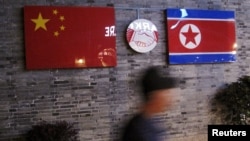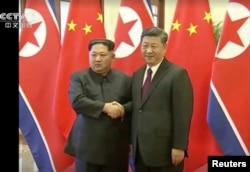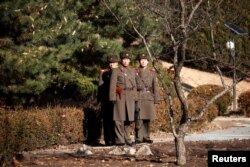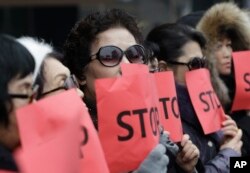China’s continued forced deportation of North Korean defectors, who face imprisonment or even death upon return to the repressive state, has received muted international criticism, as diplomatic efforts have intensified to negotiate a denuclearization deal with Pyongyang.
In the first three months of 2018, China apprehended at least 41 undocumented North Korean migrants, who crossed the Sino-Korean border trying to escape extreme poverty or political persecution under the authoritarian Kim Jong Un government, and more than 100 others between July 2016 and December 2017, according to the advocacy group Human Rights Watch.
Continued crackdown
China classifies these North Korean escapees, or defectors as they are often called, as illegal economic migrants, and forcibly returns them to North Korea, despite knowing they may be tortured under interrogation, sent to live in harsh conditions in forced labor camps or even sentenced to death.
The Chinese crackdown on these defectors, which has intensified in recent years, could get worse as relations improve between Beijing and Pyongyang, following Kim’s recent meeting with Chinese President Xi Jinping.
“If relations between China and North Korea are good, North Korean authorities will be able to put pressure on the issue of North Korean defectors,” said Ahn Chan-il, a North Korean defector and analyst with the World Institute of North Korean studies.
Kim’s expressed commitment to engage in denuclearization talks with South Korea and the U.S. has helped ease tensions in the China/North Korea alliance that had grown tense over Pyongyang’s defiant nuclear and ballistic missile tests.
To encourage his ally’s increased cooperation on nuclear negotiations, Xi is likely to demonstrate greater solidarity on border security enforcement, with little regard for humanitarian concerns.
“He’s using these defectors to say to Pyongyang that we are still your friend, we are committed to working with you, and we don’t want these people either,” said Phil Robertson, the deputy director of Human Rights Watch's Asia division.
Robertson says China’s forced deportation policy is in violation of a 1951 United Nations convention, which Beijing signed, recognizing the right of asylum for a people fleeing persecution.
North Korea increased the number of guards and security measures at the border in recent years to prevent defections that are viewed as a threat to the Kim government’s tight control over the population.
While an estimated 100,000 undocumented North Koreans currently live in China, most near the border area, they are in constant fear of forced repatriation, say human rights activists.
Nuclear priority
Many other defectors attempt dangerous journeys through China to reach a third country like Thailand or Mongolia, where they can request asylum in South Korea.
Under South Korean law, defectors are eligible to become citizens, as they are considered part of the greater Korean Peninsula. Over 30,000 North Korean defectors have received asylum in the South.
However human rights activists are concerned the progressive government of South Korean President Moon Jae-in is taking a passive approach to supporting defectors and confronting human rights violations on North Korea, in an effort to improve inter-Korean relations and facilitate a nuclear deal with the U.S.
“I had no confidence whatsoever that the South Korean government is going to push the human rights agenda with either China or North Korea at this point,” said Robertson.
The Moon administration is currently preparing for an inter-Korean summit later this month where the two Koreas will discuss the nuclear issue and also possibly restarting reunions for families separated since the start of the Korean War.
U.S. President Donald Trump has been a more vocal critic of North Korean human rights violations, and some defectors expect he will confront Kim on this issue when they meet for their summit, that is expected to take place in late May or early June.
“Although North Korea will feel uncomfortable, I am confident that the US-North Korea summit will contribute significantly to the overall improvement of human rights in North Korea,” said North Korean defector Ahn.
However other advocates have voiced concern that Trump may be using human rights criticisms as a negotiating tacit to reach a better deal to end the North Korean nuclear threat.
This story was written by VOA’s Brian Padden in Seoul. Lee Yoon-jee contributed.








